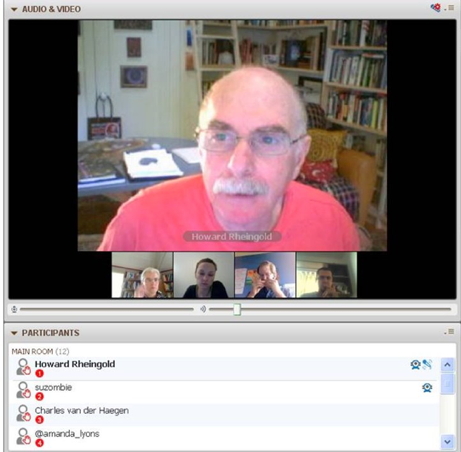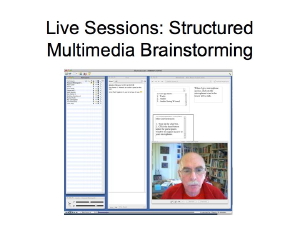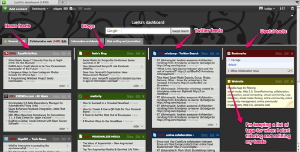Rheingold U presents a webinar by Howard Rheingold on transforming information overload into knowledge navigation
Infotention Skills: From Information Overload to Knowledge Navigation

An immersive learning experience from Rheingold U
A half-day (four hour) online workshop with Howard Rheingold introduces the mindset, attention training, online media skills, and information tools you need to transform information overload into knowledge navigation. Learn about tools to bring continuous streams of relevant information to your attention and techniques for harvesting useful knowledge and avoiding distraction.
Today's Problem: Overload vs Need to Know
In business, education, and daily life, each of us are bombarded by an overwhelming amount of information from a growing number of channels; we need to shield ourselves to avoid feeling overwhelmed. Despite a growing portfolio of tools and services at our fingertips, the sense of being adrift, falling behind, and out of control continues to grow. At the same time, each of us requires a flow of information about our interests, professional pursuits, studies -- and we need this information relevant to our specific individual needs just in time and just in place. The reason for this disconnection between abundant data and limited attention is that information technology has evolved far more quickly than educational institutions. Most people lack attentional techniques and information-handling tools to deal masterfully with the information-processing demands of an always-on society -- because we've never been given the opportunity to learn these techniques and tools systematically, within a conceptual framework that makes sense today.
From extensive study, practice, and teaching, we have developed some key models to help people deal with this growing challenge. Most people's ability to function online has developed haphazardly by learning ad-hoc technologies and approaches. What has been lacking has been a structured approach to guide us through the learning process strategically. In the ever-pressing and never-ending flood of new information, few people have been given an opportunity to step back and examine their actual needs and priorities relative to an overabundance of data. We learn through example and practice to use basic concepts such as keyword searches, figure out how to customize our user interfaces and task environments; however, we carry out these tasks in isolation and without benefit of seeing the bigger picture of what our existing requirements are (in terms of sorting and filtering information) and how to assert control and gain mastery of our own information retrieval and filtration.
The Solution: Infotention Training
Infotention -- a combination of attentional discipline and information-handling tools -- is a method for turning information overload into knowledge navigation. Howard Rheingold's Infotention Workshop offers participants the unique opportunity to acquire rapidly the mindset, attention, training, online media skills, and information tools necessary to make today's complex and changing information environment work for you instead of overwhelm you. The course enables engaged participants to develop a learning framework and habits that will result in acquiring practical, lasting skills that lead, in turn, to mastery of personal information management, regardless of the particular technologies being used. This course equips students with necessary models and methods that they can then adapt to their own needs approaches and platforms.
During the first hour of a live session, instructor Howard Rheingold explains the philosophy and methodology of infotention -- a means of training your attention to make the best use of your time and online resources -- and uses audio, video, slides, whiteboard, and text-chat to demonstrate how to create and use information dashboards, radars, and filters. During the second and third hours, Howard remains available online to answer questions while learners create their own infotention toolkits. During the final hour, learners upload screenshots and discuss their tools and methodologies. Following the live session, learners will have access to a continually updated compendium of resources and an asynchronous discussion board for asking questions, seeking technical support, and discussing their learning. Every how-to demonstrated during live sessions is documented in step-by-step slideshows available to learners.
About the Instructor
Howard Rheingold has been lecturer at University of California, Berkeley School of Information and Stanford University's Department of Communication since 2004. He is credited with coining the term "virtual community" in 1987. His 1993 book about what are now called social media, "The Virtual Community," was one of Business Week's ten best business books of 1993, and Business Week named him one of its "visionaries" of 2003. Time magazine named Rheingold's Electric Minds one of the ten best websites of 1996. The New York Times named "Smart Mobs" as one of the best ideas of 2002. He was one of the winners of HASTAC/MacArthur Foundation's Digital Media and Learning Awards in 2008, awarded Doctor of Technology degree by De Montfort University in 2009, and invited to deliver the Regents' Lecture at UC Berkeley in 2012. Endorsements by former students of Rheingold U. online courses can be found at Rheingold U.'s endorsements page. If interested, contact instructor via howard@rheingold.com
Cost for the live webinar, access to online how-to support materials and asynchronous support forum is $350, discounted to $300 for purchases of 10 seats or more. Each course cohort is limited to 10 learners.
Learning Outcomes:
Infotention strategy:
How can you know whether you are deploying your attention productively if you aren't clear about what you are supposed to be doing today? Attention strategy starts with prioritizing.
- Each learner will learn to establish a simple and fast method for assessing his or her personal goals for each day to establish a benchmark for deploying attention that day.
- The goals and methodology of mindful micro-decision-making and establishing personal attention habits equip each learner to establish, adapt, and employ attention in online environments.
- By personally constructing information radars and arranging them on knowledge dashboards, learners match their attentional tactics with the visual layout of the dashboard.
Expert discovery:
- Each learner will practice using social bookmarking services, search engines, blogrolls, and Twittter lists to find experts on a topic.
Finding feeds:
Each learner will find RSS feeds (Really Simple Syndication -- automatically updated information that is pushed to the learner's dashboard) on a specific topic by means of:
- Following a popular tag on Diigo and Delicious.com and following that tag from a particular expert.
- Establishing a persistent news search via Bing and Yahoo News and a Google Alert and extracting the RSS output.
- Following and building twitter lists and piping their feeds into a dashboard.
- Extracting RSS feeds for persistent Twitter searches.
Filtering feeds:
- Each learner will learn to create a Yahoo Pipe that turns multiple RSS feeds into a single feed and to clone pipes created by other users.
- Each learner will learn to find, clone, and customize useful pipes that have been created by others and to include their outputs in dashboards.
Configuring a dashboard:
Using Netvibes (although other RSS aggregators can be used), learners establish three different layers of categorization by means of Pages, Tabs, and Feeds.
- Learners coordinate and synchronize the spatial arrangement of tabs and feeds with their infotention strategy.
- Learners scan, shuffle, and update feeds, tabs, and pages establishing a dynamic usage pattern.
This module sets learners up for the next stage of info-knowledge refinement: curation.
Benefits for the learner
- Hone the ability to find subject matter experts and locate high quality information on the specific topics you need to know.
- Tune information radars that continuously scan and provide information on specified topics as soon as it is published.
- Develop skills and techniques for training attention and minimizing distraction.
- Gain the ability to quickly create radars, scan dashboards, pinpoint key information, and begin refining raw data into actionable knowledge.
Benefits for the Learner's Employer
- Employees waste less time, get more done online.
- Employees gain faster access to better information about subjects that affect your enterprise's bottom line.
- Employees gain information-handling skills and learning methods that make collaborations more productive.
- Employees stay up to date on tools and data relevant to their fields

